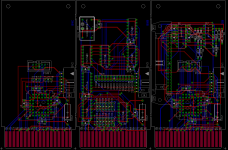Just finished uploading Version 1.0 of Console Serial Disk to Github. Here is the link
https://github.com/dustyoldcomputers/console-serial-disk
I wish I could report that this "just worked" on my PDP-12.
I configured the console baud rate for 19,200 baud to match the source code. (Actually, I first tried it at 230400, but that didn't work.) The documentation implies 9600 baud, but I went with 19.2K as per the source.
Is there a place where I need to configure stop bits? The console port uses two.
Anyway, it did not boot. The help loader bootstrap seems to have loaded stuff up to the KSF, then stopped doing anything. Here's the loader I toggled in:
0025 Load
6031 Dep
5025 Dep
6036 Dep
7012 Dep
7010 Dep
3001 Dep
2032 Dep
5025 Dep
which I think I got from server/Readme.
Also, when I type F1 to exit, I get a segmentation fault. Apparently disk_close() calls rewind() on an FD that looks undefined. GDB reports the value passed to rewind() as 0x2000000 (or however many zeroes it was).
Here's a session log with -D on:
./csd -D
SERVER: Opening CSD0 image csd0.img
SERVER: Reading the CSD image csd0.img into memory.
SERVER: Opening CSD1 image csd1.img
SERVER: Reading the CSD image csd1.img into memory.
SERVER: Opening CSD2 image csd2.img
SERVER: can't open CSD image csd2.img for read/write
SERVER: Opening CSD3 image csd3.img
SERVER: can't open CSD image csd3.img for read/write
SERVER: Opening RK0 image rk05.img
SERVER: Reading the RK05 image into memory.
SERVER: Calculating installed handler checksum.
SERVER: Installed handler checksum = 216467.
SERVER: csd0.img appears to have CONSYS.BN (20220802)
SERVER: Verifying the boot code on the boot block
SERVER: Examining the OS/8 entry point on the boot block
SERVER: Verifying the handler on the boot block
SERVER: going into terminal mode
SERVER: Shift F12 key pressed, sending boot code.
SERVER: sending 21 bytes of boot2 help code
SERVER: sending the boot block
SERVER: F1 key pressed, updating system disk image and exiting
SERVER: Writing out the CSD0 image.
SERVER: Writing out the CSD1 image.
Segmentation fault (core dumped)
So close!
Vince

